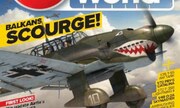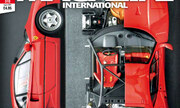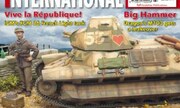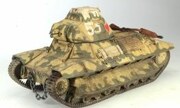FCM 36
WWII French Light Tank
ICM | No. 35336 | 1:35

Facts
- Brand:
- ICM
- Title:
- FCM 36 WWII French Light Tank
- Number:
- 35336
- Scale:
- 1:35
- Type:
- Full kit
- Released:
- 2020 New tool
- Barcode:
- 4823044406463 (EAN)
- Topic:
- FCM 36 Light Tank » Tanks (Vehicles)
Box contents
Dimensions:
315x235x45 mm
(12.4x9.3x1.8 inch)
Weight:
300 g (0.66 lbs)
Boxart designed by Valery Petelin
Product timeline
ICM
Revell
Heller
Instructions
Download 5915Kb (.pdf)
Marketplace
No partner shops available
In-box reviews
External reviews
Advertisement
 In-box review
Modellbau-Koenig
In-box review
Modellbau-KoenigAll reviews » (12 in total)
Magazines
All magazines » (3 in total)
Comments
Nice kit. It goes together quickly, but I did run into a few minor problems, and I have a few suggestions.
1) You can add the tracks after completing the model. I added them right before step 26 so I could use the missing grills on the side to help guide the tracks though.
2) Speaking of the tracks, they come in two pieces per side. I don't know what they are made of, but plastic cement doesn't work on them. Somehow, you are supposed to connect the ends together using two microscopic holes. I could not figure out how to do this, as the pins are too short and soft to go through the openings (were there actually openings, though?). I stapled one section together since it would be hidden, and used CA glue with accelerator (and my wife's help) on the other end. Placed next to the rear road wheel, it looks fine.
3) The plastic is soft! I don't have a problem with this, but be careful when removing any excess plastic from the part or you will easily shave off a bit of the part. Also, part 38 snapped in two when I barely put any pressure on it while trying to slide it over the gun assembly. Not a problem because it is hidden, but it does illustrate how soft the plastic is.
4) If you can keep the coax MG from snapping off during assembly, I bow before your awesomeness! I almost made it, but it finally snapped off during one of the final steps of painting the complex camouflage pattern. Luckily, it landed right in front of me in clear view so I CA glued it back on - after the paint job was done! A stretched piece of sprue would have made an easy replacement.
5) It's pretty obvious but I'll say it anyway, to make your life easier, paint the completed roadwheel assembly before you add parts A5 and A12 . In fact, paint parts A5 and A12 before you add them to the kit to save yourself unnecessary masking.
6) I think parts A1 and A15 are reversed in the instructions. However, I fiddled around with both so much, in the end I wasn't sure anymore. By the way, be careful with the ends that stick out on both parts. I almost snapped off one because - you guessed it - super soft plastic.
7) Steps 24 and 25 were tricky for me. B4 and B5 didn't quite want to sit flush with the hull without some fiddling around with them. The same with the attaching the upper hull to the lower. I got it to work, but I did have to put a bit of putty on some tiny sections that were just a tad off.
8) The kit provides link by link plastic chains and one long chain that seems like metal but is very brittle. I used the long chin by simply cutting off the portion I needed. It worked fine.
So there you have it. The paint scheme probably took longer than actually building the kit. I really didn't know much about this tank, so I kind of like it better than some of the other early war French tanks I have been building lately. I think the look of the turret is unique. If you are trying to build all the Battle of France armor like I am, you should get this kit.
20 March 2024, 03:35
Great! I hope this means we can expect ICM to release a 7,5cm PaK40(Sf) auf PzKpfw.FCM(f) in the future, currently a missing link in the available (and affordable..) 1/35 Marder family.
1 17 January 2020, 09:38
Projects
Gallery
Reference material
All walkarounds » (1 in total)
 rc modeling database | stash manager
rc modeling database | stash manager




















